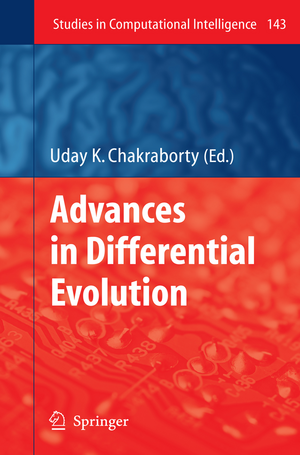Advances in Differential Evolution: Studies in Computational Intelligence, cartea 143
Editat de Uday K. Chakrabortyen Limba Engleză Hardback – 23 iul 2008
The fourteen chapters of this book have been written by leading experts in the area. The first seven chapters focus on algorithm design, while the last seven describe real-world applications. Chapter 1 introduces the basic differential evolution (DE) algorithm and presents a broad overview of the field. Chapter 2 presents a new, rotationally invariant DE algorithm. The role of self-adaptive control parameters in DE is investigated in Chapter 3. Chapters 4 and 5 address constrained optimization; the former develops suitable stopping conditions for the DE run, and the latter presents an improved DE algorithm for problems with very small feasible regions. A novel DE algorithm, based on the concept of "opposite" points, is the topic of Chapter 6. Chapter 7 provides a survey of multi-objective differential evolution algorithms. A review of the major application areas of differential evolution is presented in Chapter 8. Chapter 9 discusses the application of differential evolution in two important areas of applied electromagnetics. Chapters 10 and 11 focus on applications of hybrid DE algorithms to problems in power system optimization. Chapter 12 applies the DE algorithm to computer chess. The use of DE to solve a problem in bioprocess engineering is discussed in Chapter 13. Chapter 14 describes the application of hybrid differential evolution to a problem in control engineering.
| Toate formatele și edițiile | Preț | Express |
|---|---|---|
| Paperback (1) | 989.79 lei 6-8 săpt. | |
| Springer Berlin, Heidelberg – 30 noi 2010 | 989.79 lei 6-8 săpt. | |
| Hardback (1) | 996.07 lei 6-8 săpt. | |
| Springer Berlin, Heidelberg – 23 iul 2008 | 996.07 lei 6-8 săpt. |
Din seria Studies in Computational Intelligence
- 20%
 Preț: 449.37 lei
Preț: 449.37 lei - 20%
 Preț: 1158.26 lei
Preț: 1158.26 lei - 20%
 Preț: 986.66 lei
Preț: 986.66 lei - 20%
 Preț: 1452.76 lei
Preț: 1452.76 lei - 20%
 Preț: 168.78 lei
Preț: 168.78 lei - 20%
 Preț: 1291.10 lei
Preț: 1291.10 lei - 18%
 Preț: 1112.30 lei
Preț: 1112.30 lei - 20%
 Preț: 565.39 lei
Preț: 565.39 lei - 20%
 Preț: 649.28 lei
Preț: 649.28 lei - 20%
 Preț: 1047.73 lei
Preț: 1047.73 lei - 20%
 Preț: 1578.96 lei
Preț: 1578.96 lei - 20%
 Preț: 643.50 lei
Preț: 643.50 lei - 20%
 Preț: 657.49 lei
Preț: 657.49 lei - 20%
 Preț: 993.28 lei
Preț: 993.28 lei - 20%
 Preț: 990.80 lei
Preț: 990.80 lei - 20%
 Preț: 989.96 lei
Preț: 989.96 lei - 20%
 Preț: 1165.69 lei
Preț: 1165.69 lei - 20%
 Preț: 1444.52 lei
Preț: 1444.52 lei - 20%
 Preț: 1041.96 lei
Preț: 1041.96 lei - 20%
 Preț: 1047.73 lei
Preț: 1047.73 lei - 20%
 Preț: 1046.06 lei
Preț: 1046.06 lei - 18%
 Preț: 2500.50 lei
Preț: 2500.50 lei - 20%
 Preț: 989.13 lei
Preț: 989.13 lei - 20%
 Preț: 1165.69 lei
Preț: 1165.69 lei - 20%
 Preț: 1164.05 lei
Preț: 1164.05 lei - 20%
 Preț: 1042.79 lei
Preț: 1042.79 lei - 20%
 Preț: 1460.19 lei
Preț: 1460.19 lei - 18%
 Preț: 1403.52 lei
Preț: 1403.52 lei - 18%
 Preț: 1124.92 lei
Preț: 1124.92 lei - 20%
 Preț: 1039.47 lei
Preț: 1039.47 lei - 20%
 Preț: 1008.11 lei
Preț: 1008.11 lei - 20%
 Preț: 1045.25 lei
Preț: 1045.25 lei - 20%
 Preț: 1275.42 lei
Preț: 1275.42 lei - 20%
 Preț: 1040.32 lei
Preț: 1040.32 lei - 20%
 Preț: 988.32 lei
Preț: 988.32 lei - 20%
 Preț: 1169.79 lei
Preț: 1169.79 lei - 20%
 Preț: 1162.37 lei
Preț: 1162.37 lei - 20%
 Preț: 1059.26 lei
Preț: 1059.26 lei - 20%
 Preț: 1164.05 lei
Preț: 1164.05 lei - 20%
 Preț: 1166.52 lei
Preț: 1166.52 lei - 20%
 Preț: 1459.38 lei
Preț: 1459.38 lei - 18%
 Preț: 1005.74 lei
Preț: 1005.74 lei - 20%
 Preț: 997.38 lei
Preț: 997.38 lei - 20%
 Preț: 1055.94 lei
Preț: 1055.94 lei - 20%
 Preț: 1284.47 lei
Preț: 1284.47 lei - 20%
 Preț: 994.08 lei
Preț: 994.08 lei - 20%
 Preț: 1048.72 lei
Preț: 1048.72 lei - 20%
 Preț: 1066.02 lei
Preț: 1066.02 lei - 20%
 Preț: 943.78 lei
Preț: 943.78 lei - 20%
 Preț: 1173.10 lei
Preț: 1173.10 lei
Preț: 996.07 lei
Preț vechi: 1245.09 lei
-20% Nou
Puncte Express: 1494
Preț estimativ în valută:
190.59€ • 199.01$ • 157.39£
190.59€ • 199.01$ • 157.39£
Carte tipărită la comandă
Livrare economică 15-29 aprilie
Preluare comenzi: 021 569.72.76
Specificații
ISBN-13: 9783540688273
ISBN-10: 3540688277
Pagini: 352
Ilustrații: X, 339 p.
Dimensiuni: 155 x 235 x 18 mm
Greutate: 0.67 kg
Ediția:2008
Editura: Springer Berlin, Heidelberg
Colecția Springer
Seria Studies in Computational Intelligence
Locul publicării:Berlin, Heidelberg, Germany
ISBN-10: 3540688277
Pagini: 352
Ilustrații: X, 339 p.
Dimensiuni: 155 x 235 x 18 mm
Greutate: 0.67 kg
Ediția:2008
Editura: Springer Berlin, Heidelberg
Colecția Springer
Seria Studies in Computational Intelligence
Locul publicării:Berlin, Heidelberg, Germany
Public țintă
ResearchCuprins
Differential Evolution Research – Trends and Open Questions.- Eliminating Drift Bias from the Differential Evolution Algorithm.- An Analysis of the Control Parameters’ Adaptation in DE.- Stopping Criteria for Differential Evolution in Constrained Single-Objective Optimization.- Constrained Optimization by ? Constrained Differential Evolution with Dynamic ?-Level Control.- Opposition-Based Differential Evolution.- Multi-objective Optimization Using Differential Evolution: A Survey of the State-of-the-Art.- A Review of Major Application Areas of Differential Evolution.- The Differential Evolution Algorithm as Applied to Array Antennas and Imaging.- Applications of Differential Evolution in Power System Optimization.- Self-adaptive Differential Evolution Using Chaotic Local Search for Solving Power Economic Dispatch with Nonsmooth Fuel Cost Function.- An Adaptive Differential Evolution Algorithm with Opposition-Based Mechanisms, Applied to the Tuning of a Chess Program.- Differential Evolution for the Offline and Online Optimization of Fed-Batch Fermentation Processes.- Worst Case Analysis of Control Law for Re-entry Vehicles Using Hybrid Differential Evolution.
Recenzii
From the reviews:“The book presents the state of the art in differential evolution in 14 chapters, written by different authors. … Since the differential evolution is a special topic within optimization, the book will be most interesting for the reader who is interested in optimizing his or her own special scientific problem. It introduces the theoretical and programming-oriented aspects of differential evolution.” (Gudula Runger, ACM Computing Reviews, March, 2010)
Textul de pe ultima copertă
Differential evolution is arguably one of the hottest topics in today's computational intelligence research. This book seeks to present a comprehensive study of the state of the art in this technology and also directions for future research.
The fourteen chapters of this book have been written by leading experts in the area. The first seven chapters focus on algorithm design, while the last seven describe real-world applications. Chapter 1 introduces the basic differential evolution (DE) algorithm and presents a broad overview of the field. Chapter 2 presents a new, rotationally invariant DE algorithm. The role of self-adaptive control parameters in DE is investigated in Chapter 3. Chapters 4 and 5 address constrained optimization; the former develops suitable stopping conditions for the DE run, and the latter presents an improved DE algorithm for problems with very small feasible regions. A novel DE algorithm, based on the concept of "opposite" points, is the topic of Chapter 6. Chapter 7 provides a survey of multi-objective differential evolution algorithms. A review of the major application areas of differential evolution is presented in Chapter 8. Chapter 9 discusses the application of differential evolution in two important areas of applied electromagnetics. Chapters 10 and 11 focus on applications of hybrid DE algorithms to problems in power system optimization. Chapter 12 applies the DE algorithm to computer chess. The use of DE to solve a problem in bioprocess engineering is discussed in Chapter 13. Chapter 14 describes the application of hybrid differential evolution to a problem in control engineering.
The fourteen chapters of this book have been written by leading experts in the area. The first seven chapters focus on algorithm design, while the last seven describe real-world applications. Chapter 1 introduces the basic differential evolution (DE) algorithm and presents a broad overview of the field. Chapter 2 presents a new, rotationally invariant DE algorithm. The role of self-adaptive control parameters in DE is investigated in Chapter 3. Chapters 4 and 5 address constrained optimization; the former develops suitable stopping conditions for the DE run, and the latter presents an improved DE algorithm for problems with very small feasible regions. A novel DE algorithm, based on the concept of "opposite" points, is the topic of Chapter 6. Chapter 7 provides a survey of multi-objective differential evolution algorithms. A review of the major application areas of differential evolution is presented in Chapter 8. Chapter 9 discusses the application of differential evolution in two important areas of applied electromagnetics. Chapters 10 and 11 focus on applications of hybrid DE algorithms to problems in power system optimization. Chapter 12 applies the DE algorithm to computer chess. The use of DE to solve a problem in bioprocess engineering is discussed in Chapter 13. Chapter 14 describes the application of hybrid differential evolution to a problem in control engineering.
Caracteristici
This book seeks to present a comprehensive study of the state of the art in differential evolution


















